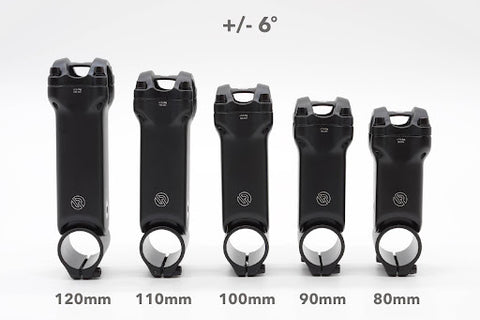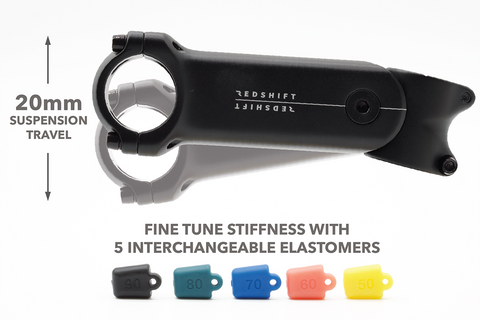
Selecting the appropriate stem length for your bike is a crucial aspect of optimizing performance and comfort. There are a variety of factors that affect what stem length is right for you including frame size, body proportions, flexibility, bike type, and the type of terrain you ride. In this comprehensive guide, we will explore how to choose the right stem length for gravel bikes, road bikes, mountain bikes & e-bikes. By understanding the impact that bike stem length can have on performance in different riding conditions, you can enhance comfort, control, and overall enjoyment of your cycling adventures. Learn how to choose a stem length for your bike below.
Shop Suspension Stems for Gravel Bikes and More
Key Consideration When Choosing Bike Stem Length: Bike fit
While terrain and bike type do influence stem length to some extent, the most important factor in selecting a length is how it affects your bike fit. Bike fit refers to the adjustment and selection of bike components (such as saddle position and handlebar reach and rise) to optimize comfort, efficiency, and performance for the rider. The goal is to ensure that the bike is set up to fit an individual's body, riding style, and biomechanics.
A professional bike fit using an App like MyVeloFit or visiting your local bike shop or fit studio can provide invaluable insights into your unique biomechanics, helping determine the ideal stem length among other key bike set up information.
It's also important to note that a bike fit will provide a range for stem length and from there you can factor in other aspects like bike type and terrain to find the sweet spot. Below are details on how different bike types and terrain can influence stem length choice.
Bike Stem Length for Gravel Biking: Versatility and Mixed Terrain
Gravel bike stem length is generally 70 to 100mm but opinions and preferences vary.
Gravel biking requires a versatile approach, as it encompasses a variety of terrain, including gravel roads, dirt paths, and pavement. The ideal stem length for gravel biking strikes a balance between stability and maneuverability providing stability for longer stretches of gravel or mixed terrain while offering agility for handling technical sections.A slightly shorter stem for gravel bikes 70 to 90 mm can enhance maneuverability and control, making it suitable for gravel climbs and technical descents. Shorter stems facilitate weight distribution and allow for quick steering inputs, ensuring responsiveness on uneven surfaces. Additionally, a shorter stem can alleviate strain on the upper body during long-distance gravel rides by pushing you into a slightly more upright position.
Bike Stems for Road Cycling: Speed, Efficiency, and Aerodynamics
Stem Length for Road Bike - 90mm to 140mm
For road cycling, stem length plays a critical role in achieving an optimal riding position that balances speed, efficiency, and aerodynamics. Longer stems are commonly used in road riding to promote a more stretched-out, aerodynamic position. This extended reach reduces wind resistance (drag) by allowing the rider to stretch out and reduce frontal area when riding with a drop bar and is the same effect you get from using aerobars on a road bike.
Bike Stems Length for Mountain Biking: Technical Trails and Aggressive Descents
Stem length for MTB - 35mm and 80mm
When it comes to mountain biking, stem length plays a crucial role in handling technical trails and aggressive descents. For tackling demanding terrain, a shorter stem provides better maneuverability and control. It allows for quick steering inputs, making it ideal for navigating tight corners, technical sections, and climbing steep trails.
However, it's important to find a balance between agility and stability. For cross-country or trail riding, a slightly longer stem can offer stability during high-speed descents while maintaining sufficient maneuverability for technical sections.
Bike Stems Length for E-Bikes & City Cycling: Get Upright
For E-bike and city or recreational riding comfort is key. While a shorter stem length can help with comfort it is actually more important to have an upright position, making the stem rise even more critical. Opting for a hi-rise or adjustable rise stem can help facilitate an upright position on the bike which will give you more comfort and reduce strain on the upper body.
Suspension Stems

While getting the length and angle right on a bike stem is essential for rider comfort and, ultimately, performance, some stems afford an additional level of performance enhancing comfort in the form of integrated suspension. Suspension stems allow gravel and road riders to get the benefits of suspension without the bulky addition of front suspension forks, all contained within the stem itself. The Redshift Suspension Stem, uses a shock absorbing elastomer design that flexes in response to road or trail imperfections, thereby reducing the shocks transmitted to the rider's hands and upper body. This can lead to less fatigue and a more comfortable ride, especially over longer distances.
If you need help choosing a Redshift Sports Shockstop Stem size for your bike, check out our guide here or reach out to us at support@redshiftsports.com.

